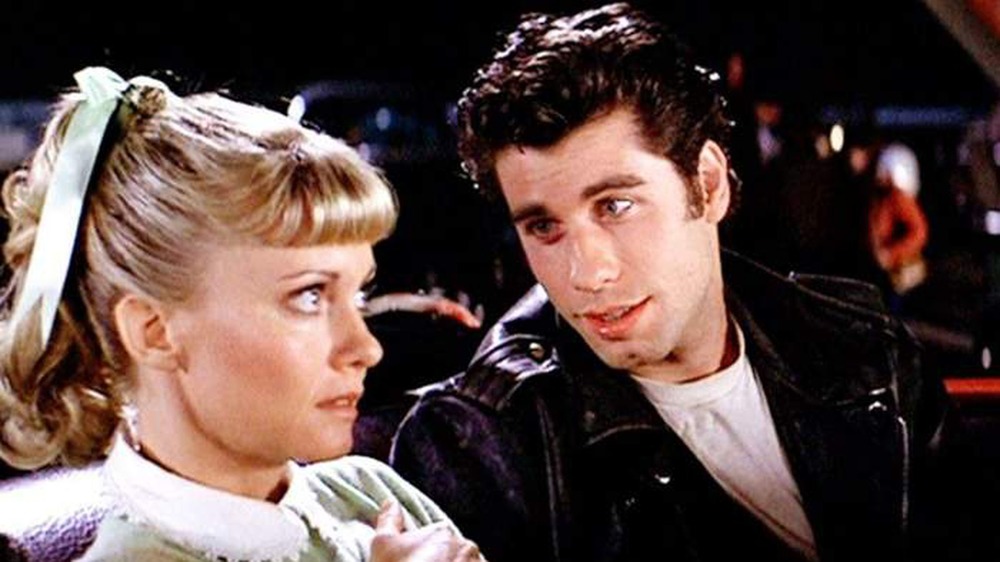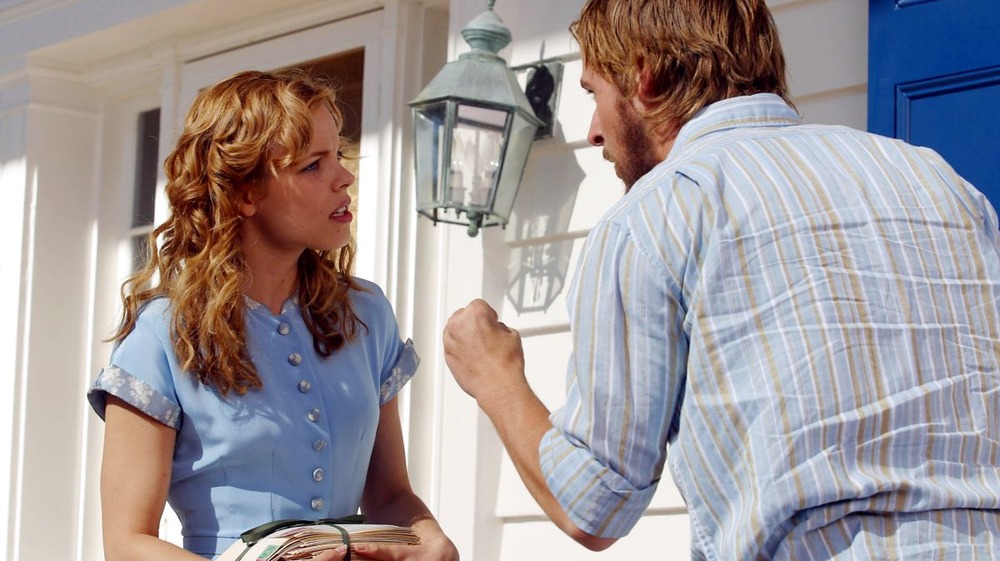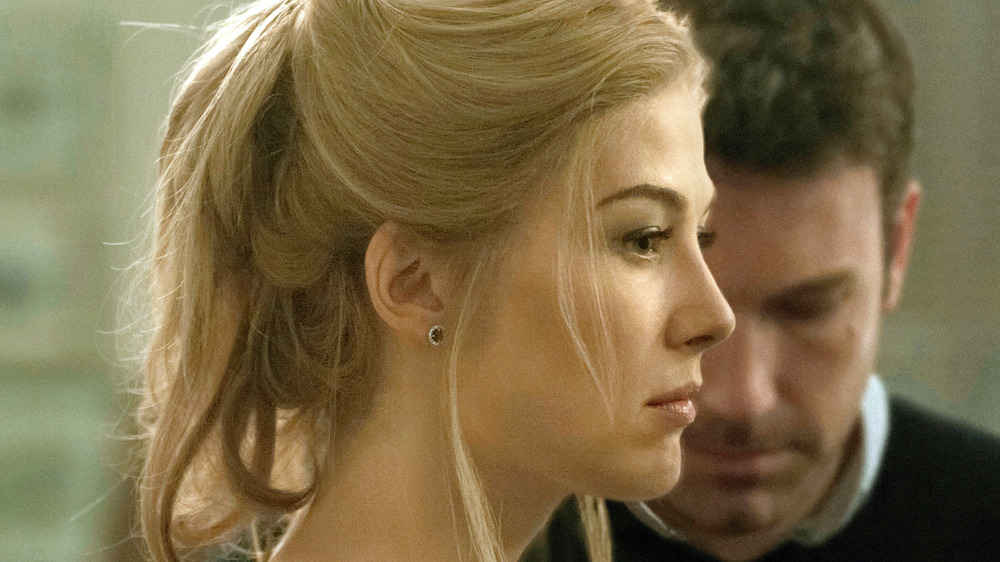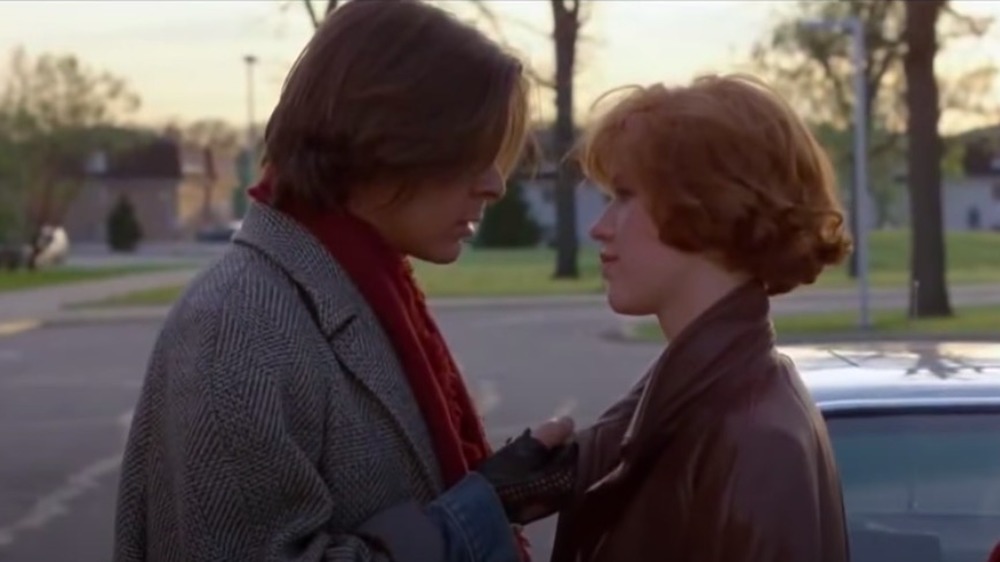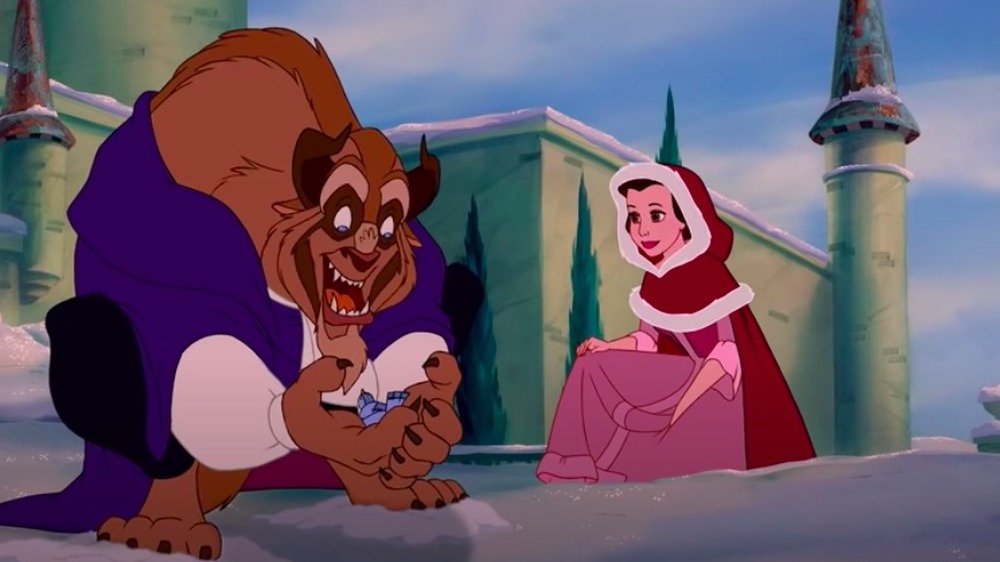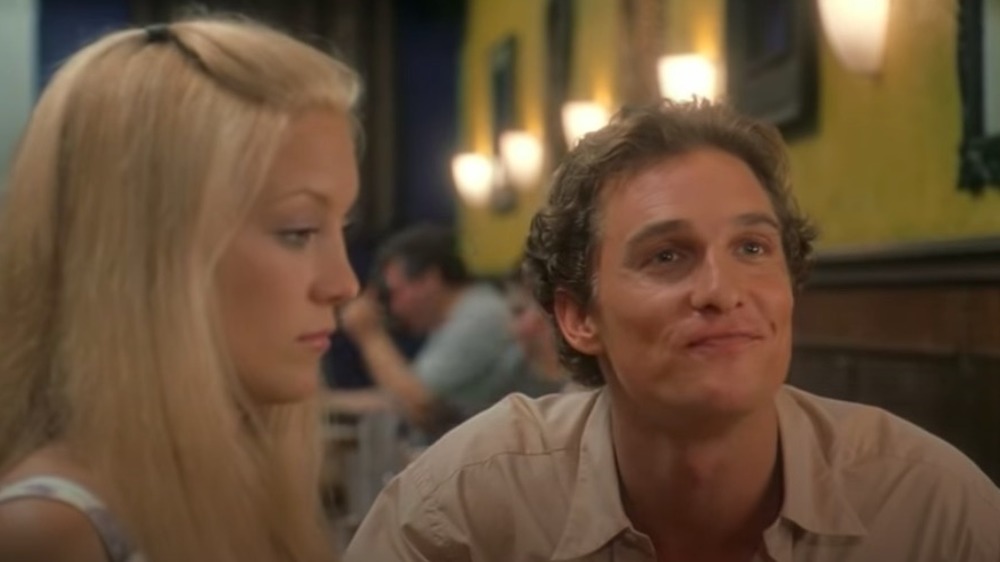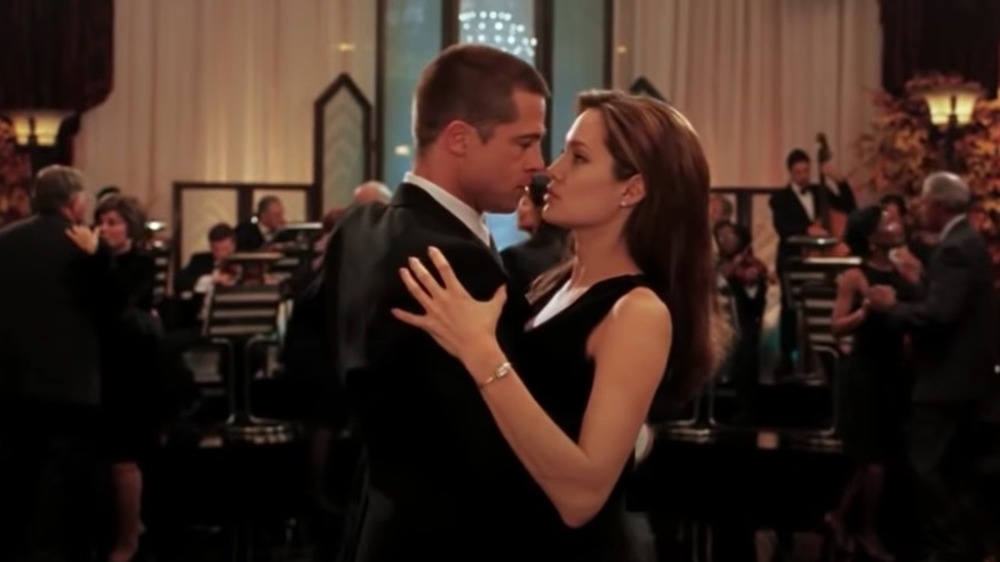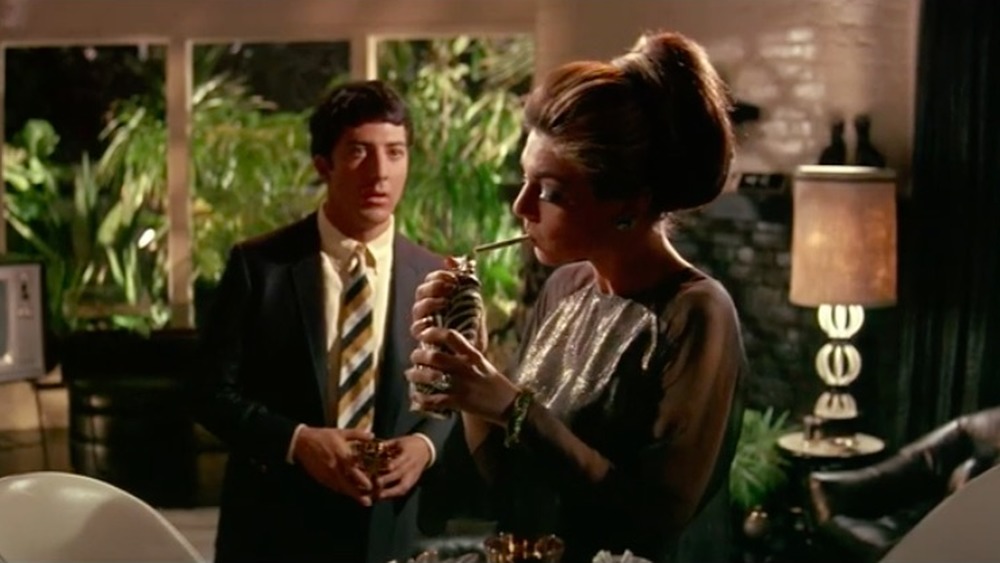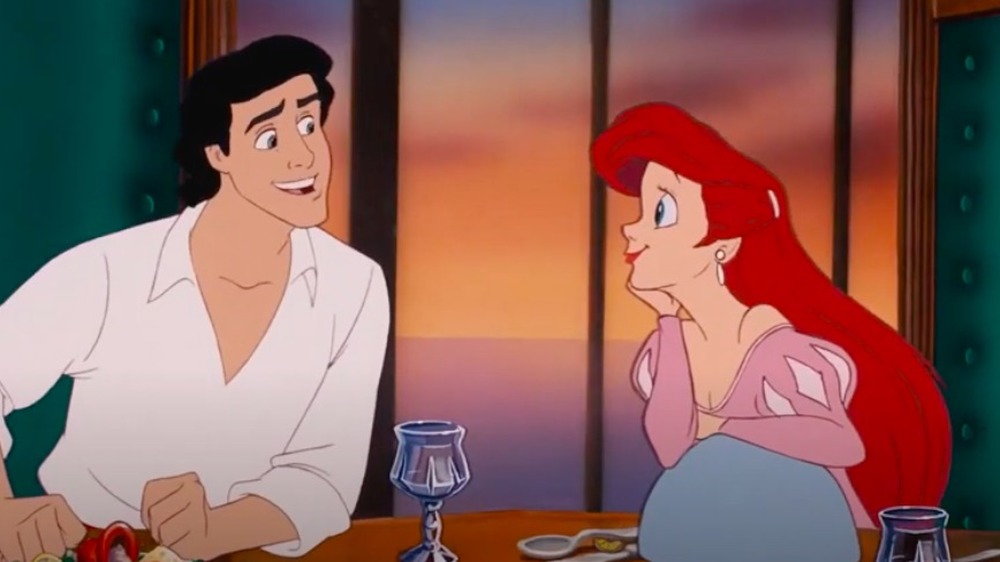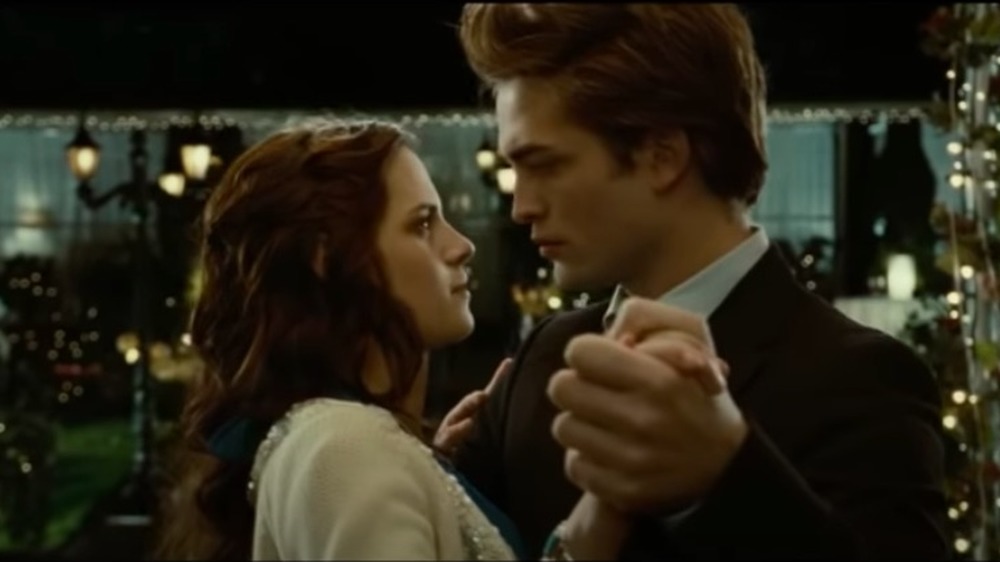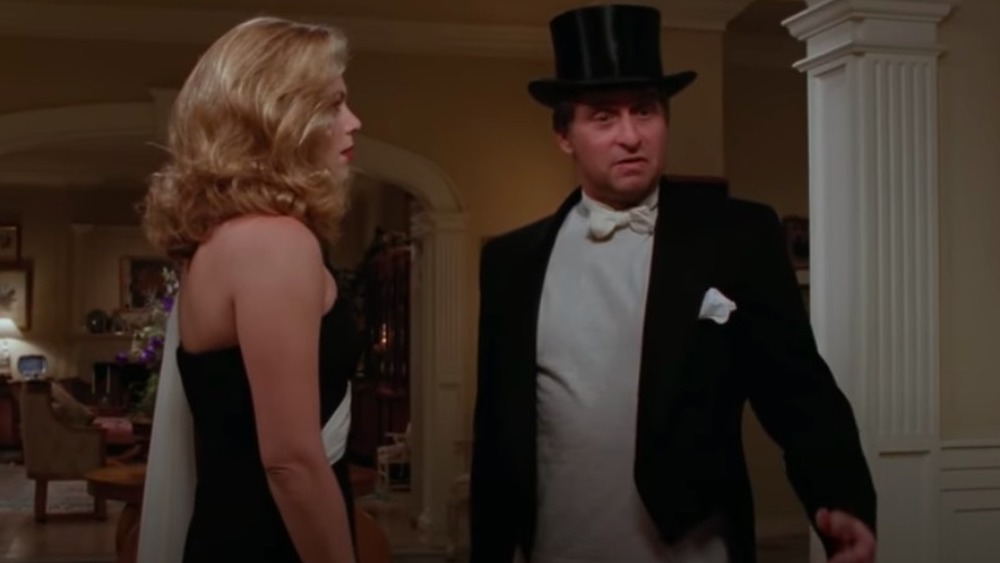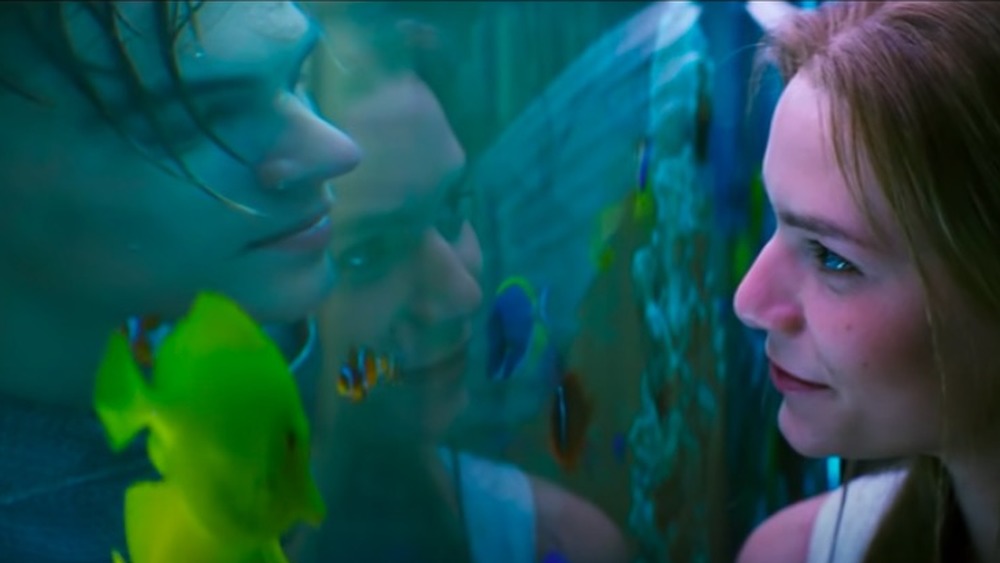The Most Toxic Couples In Movie History
Cinema is full of iconic couples — Rose and Jack in Titanic, Ilsa and Rick in Casablanca, and Jack and Ennis in Brokeback Mountain, to name just a few. Yet some of the most well-known and most beloved movie couples are also examples of toxic behavior in relationships.
While some of the toxic behavior exhibited by the couples we've singled out here is obvious, some of it is more subtle, and easy to miss in the epic sweep of a well-told love story. (Gorgeous cinematography and a heartstring-tugging soundtrack can do that.) Some of the following films seem to be fully aware of the harmful behavior between the couples at the center of their stories, and the toxicity is part of the plot. However, many films present damaging behavior as either redeemable or simply romantic. With all that in mind, here's a breakdown of some of the most toxic couples in movie history.
Sandy and Danny, Grease
Based on a popular stage musical, Grease became a beloved film as well thanks to the smash hit adaptation starring John Travolta and Olivia Newton-John. The story centers on Danny (Travolta) and Sandy (Newton-John), teens who have a summer fling with the expectation that Sandy will move back to Australia with her family. When this doesn't happen, they end up at the same high school where Danny, putting on a bad boy act for his friends, blows off Sandy.
The first bad sign arises when Danny talks to his friends about her in a misleading way, hinting at sex they didn't have. When they start to date again, Danny takes Sandy to a drive-in movie, during which he tries to force himself on her. He insists that "nobody can see" while Sandy continues to struggle, before she manages to get out of the car. And in the end, both of them change themselves to win back the other: Danny gets into sports and starts wearing a letterman jacket (because Sandy once dated a jock) and Sandy, in a complete makeover, shows up in an all-black outfit with tight-fitting leather pants while smoking a cigarette. While Danny merely puts on a different jacket, Sandy's entire behavior changes. She's suddenly walking with a strut and speaking differently.
The couple ends up together, but only after sexual assault and a complete personality makeover for Sandy to fit the mold of what Danny wants.
Allie and Noah, The Notebook
The Notebook is easily one of the most famous romance movies ever made; it has many famous lines ("If you're a bird, I'm a bird") and scenes (making out in the rain). Their characters, Allie and Noah, reconnect after years broken up due to her family's interference and reevaluate their lives apart (including Allie's engagement to another man).
Allie and Noah's relationship is problematic from the start. They meet at a fair and when Allie says no to Noah's advances, he takes it upon himself to hang from a ferris wheel Allie is sitting in with a date and threaten suicide until she agrees to go out with him. After the carnival incident, Noah continues to hound Allie about a date until she's finally tricked into it with help from mutual friends. Eventually Allie does return Noah's feelings and they begin a relationship — and during that relationship, they often have arguments that turn violent. These frequent arguments, always followed by enthusiastically making up, are depicted as a result of how crazy they are for each other rather than unacceptable behavior. This doesn't even cover how, when they reconcile years later, it involves Allie cheating on her fiancée, making this one of many films to romanticize infidelity.
While The Notebook does have many merits — the leads' chemistry is striking, the plot is well-structured — the healthiness of the relationship is not one of them.
Amy and Nick, Gone Girl
Gone Girl is a key example of how a toxic relationship can be crucial to a film's plot. Amy and Nick seem like a happy couple from the outside, but after Amy goes missing on their fifth wedding anniversary, the real nature of the relationship is called into question when Nick becomes the prime suspect for the assumed murder.
In the major plot twist of the film, Amy is revealed to be alive — and responsible for faking her own death and framing her husband. Viewers discover that while Nick was a bad husband — he became distant and cheated on Amy with one of his students — Amy is the one who takes the toxicity of this marriage to a whole new level. Then, after her fake death plan falters, she returns to Nick and forces him into a narrative of their happy reconciliation. To combat Nick's plan to leave the marriage, she gets herself pregnant with Nick's sperm kept at a fertility clinic, forcing him to stay.
Amy's and Nick's relationship is defined by manipulation, lying and plotting. Gone Girl is another film in which the couple stays together in the end — but this time, to calamitous effect.
Claire and John, The Breakfast Club
One of the most beloved films of the '80s, The Breakfast Club follows a group of teenagers from different high school cliques who all end up in Saturday detention. By the end of detention, the teens, though from different social circles, have a better understanding of one another. Two members of the group, Claire Standish (Molly Ringwald) and John Bender (Judd Nelson), get together in the end — a seemingly happy ending that takes place under a toxic cloud.
John continuously mocks Claire, prods her about personal questions relating to her sexual experience, and takes out his rage on her. John brings up Claire's sexuality in a number of instances, each time either mocking or prying, ignoring her clear discomfort. In the most problematic moment, John, while hiding under the desk from the principal, abruptly sticks his head between her legs.
Ringwald wrote an essay in the New Yorker in 2018, reflecting on the problems with The Breakfast Club. She discusses Hughes' "glaring blind spot" of how Claire is treated by John. She continues, "He never apologizes for any of it, but, nevertheless, he gets the girl in the end."
Belle and the beast, Beauty and the Beast
At first glance, Beauty and the Beast — the story of a man whose selfishness results in a curse turning him into a beast, only reversible by the true love of another — presents a much healthier romance than some of the Disney princess movies that came before it.
And while these are improvements and there are merits both to the film and to their relationship — learning to love someone despite their flaws is a valuable lesson — it's depicted clumsily in the 1991 animated film, as well as the 2017 live-action remake. Ultimately, the toxic nature between Belle and the beast comes down to Stockholm Syndrome, something that has now been discussed and written about extensively. There are debates about whether Belle actually experiences the syndrome, but what can't be disputed is that their relationship begins in forced captivity.
Belle is resentful and wary of the beast at first, before eventually warming up to him. But does she genuinely develop feelings for him, or is she making the most of her (captive) situation? There's no real way to tell, and the question lingers over the whole relationship. Over time, they fall in love and, at one point, he does allow her to leave — but it's still his decision. In the end, the beast becomes human again and they end up together, but the audience will never know if Belle would have chosen this life had she not been forced into it in the first place.
Andie and Ben, How to Lose a Guy in 10 Days
In How to Lose a Guy in 10 Days, we meet Andie Anderson (Kate Hudson), an advice columnist whose new assignment is to ruin a new relationship within ten days, using only the so-called "classic mistakes women make." Meanwhile, Ben Barry (Matthew McConaughey), an advertising executive, makes a bet that he can make any woman fall in love with him in ten days.
There are a multitude of romantic comedies that depict toxic relationship behavior, but How to Lose a Guy in 10 Days in a prime example of toxicity from both party sides. Both Andie and Ben have insincere ulterior motives and manipulate each other along the way. Andie jumps through hoops to make dating her an awful experience, while Ben puts up with it all, acting both passive and acceptive in situations that he actually isn't okay with.
In the end, it doesn't matter to either one of them that they were being manipulated and that their origin story as a couple is not exactly romantic. Further, Ben convinces Andie not to go to an interview for a dream job — and just like that, Andie gives it up to be with a guy she dated for ten whole days.
John and Jane, Mr. and Mrs. Smith
Presenting another mutually destructive relationship, in Mr. and Mrs. Smith, John (Brad Pitt) is a "construction executive" and his wife Jane (Angelina Jolie) is a "tech support consultant" — or at least those are the jobs that they think each one has. In reality, they are both assassins, working at competing agencies, and have been lying about their real careers. While initially happy together, they have become stuck in a marriage they both find suffocating and unfulfilling. When John and Jane receive the assignment to kill each other, their marriage is suddenly no longer stuck in mundanity.
Their relationship is built upon lies from both sides — this brings up the question of how much of their real selves the two revealed when such a major part of their lives — the fact that they kill people for a living — was concealed. Additionally, they spend the bulk of the movie trying to kill each other. It takes the idea of being resentful of your unhappy marriage to the next level.
The two reconcile, their love rekindled — this time more intense, now that they know the truth — but it doesn't negate the several years (and intense, murderous few months) of toxicity their relationship was founded on (and made the movie so entertaining in the first place).
Ben and Mrs. Robinson, The Graduate
Mike Nichols' The Graduate — about a recent 21-year-old college graduate, Benjamin Braddock (Dustin Hoffman), who begins an affair with a married older woman, Mrs. Robinson (Anne Bancroft), then falls in love with her daughter Elaine (Katharine Ross) — is widely considered one of the greatest films ever made. Its cinematic merits are undeniable, including its strong plot — which includes an (effectively executed) toxic relationship.
While Ben's relationship with Elaine, whom he ends up with, has its own toxic elements — he engages in stalking behavior, for example — it's the infamous relationship with Mrs. Robinson that proves more toxic. Their tryst begins only after a significant amount of aggressive coaxing and manipulating from her side. After convincing him to drive her home from a party, she forces him to stick around despite him announcing his discomfort. When he confronts her motives — the famous line, "Mrs. Robinson, you're trying to seduce me" — she feigns innocence and makes him feel terrible about his (correct) assumption. The encounter escalates to her trapping him in Elaine's room, where she presents her naked self to a distressed Ben.
When they later meet at a hotel, Ben tries to back out at the last moment and Mrs. Robinson intentionally provokes him, saying he must be sexually inadequate. Finally, after the affair has ended and Ben has fallen for Elaine, Mrs. Robinson tells Elaine that Ben raped her. It's a serious allegation that is, oddly, never brought up again — but the viewer doesn't forget.
Ariel and Eric, The Little Mermaid
Even though The Little Mermaid was praised for presenting a more three-dimensional female lead, Disney definitely still had some progress to make in terms of depicting healthy relationships. The story introduces Ariel, a young mermaid princess, who dreams of escaping her sea life in favor of life as a human.
The whole of the plot rests on Ariel's love for Prince Eric, who she falls for instantly after seeing him from afar on a ship. After she rescues him from a wreck, he falls in love in return. After this brief encounter sparks their intense infatuation, they become determined to find each other again.
Ariel then makes a deal with Ursula, the evil sea witch, trading in her voice for human legs. Ariel literally gives up her voice for a man she doesn't even know — not exactly a role model decision. Thus, without her voice, any courtship between them can only be one-sided, with Eric being the only one to voice opinions or interests. Plus, Eric doesn't even recognize Ariel as the girl who saved him (and he claimed to love). And when Ursula disguises herself and uses Ariel's voice to trick Eric, he drops his courtship with Ariel and plans to marry Ursula the next day. This somehow doesn't bother Ariel when everything is resolved and she and Eric finally marry.
Bella and Edward, Twilight
Despite its vast popularity as a teen romance series, Twilight — in which Bella Swan (Kristen Stewart), after moving to Forks, Washington, falls in love with a 104-year-old vampire, Edward Cullen (Robert Pattinson) — is inarguably toxic in several ways.
Firstly, there's the age difference; despite Edward looking like a 17-year-old, he was born in 1901, making him 87 years older than Bella. The power dynamic is further skewed — Edward is a literal vampire and could easily kill her at any moment (and, in fact, has the persistent urge to, as Bella's blood is especially desirable to him). Next, when Bella starts figuring out that Edward is a vampire, he gaslights her on multiple occasions. And finally, before the two of them get together, Edward stalks her on multiple occasions, including while she sleeps and on a trip to Port Angeles that Bella takes with her friends. Both of these stalking examples are not only justified in the film, but romanticized.
The toxicity of Bella and Edward has been written about countless times, from entertainment sites to more scholarly publications such as Psychology Today. When it's broken down, Bella and Edward — one of the most famous couples from any young adult series — don't exactly have a romance to be admired or emulated.
Oliver and Barbara, The War of the Roses
Oliver (Michael Douglas) and Barbara Rose (Kathleen Turner), the main characters of Danny DeVito's War of the Roses, are a wealthy couple whose marriage has turned sour over the years, resulting in an increasingly intense feud over their property and belongings.
Their marriage is toxic while they're still together, exemplified by Oliver's selfish, dismissive behavior and Barabara's ensuing contempt toward him. When Oliver thinks he may be having a heart attack, Barbara barely blinks an eye. But after they decide to divorce, their behavior continues to escalate, becoming more and more destructive. Barbara and Oliver try to undermine each other in various ways, including Barbara attempting to seduce Oliver's lawyer to get her way. Both of them start destroying objects around the house. When Oliver runs over Barbara's cat — albeit accidentally — she gets back at him by trapping him in the sauna, leading to near heatstroke.
Finally, their destructiveness reaches its apex in a physical fight initiated by Oliver. Barbara loosens the chandelier to drop on Oliver, but instead, they both end up hanging from it. Ultimately, they both fall from the ceiling and die — but not before Barbara pushes away Oliver's last attempt to make peace.
Romeo and Juliet, Romeo + Juliet
Shakespeare's famed Romeo and Juliet tells the story of Romeo Montague and Juliet Capulet, two teenagers from feuding families who fall in love — and become the most well-known "star-crossed" lovers in western culture. It's been adapted for the screen multiple times, including George Cukor's Oscar-nominated 1936 version and Baz Luhrmann's 1996 production starring Leonardo Dicraprio and Claire Danes.
This is another case of "love at first sight," otherwise known as infatuation mistaken for true love, and they marry within days. Romeo is banished from Verona after killing Juliet's cousin Tybalt, his emotional response to Tybalt killing Romeo's own cousin Mercutio. Juliet flees Verona, escaping the marriage her family wants for her, and finds Friar Laurence. It is Friar Laurence who gives Juliet the potion that'll allow her to fake her own death. Romeo, thinking Juliet's death is real, kills himself. And when Juliet finds Romeo dead, she kills herself too.
With Romeo and Juliet being so young — in Shakespeare's text, she's merely 13 — it makes sense that they mistake their intense infatuation for love. It doesn't, however, make their relationship any less toxic, considering their rush to get married and a lack of communication that literally results in death. Their relationship becomes all-consuming as soon as it begins, and ends with them both giving their lives for a relationship so short-lived it doesn't even last a week.

